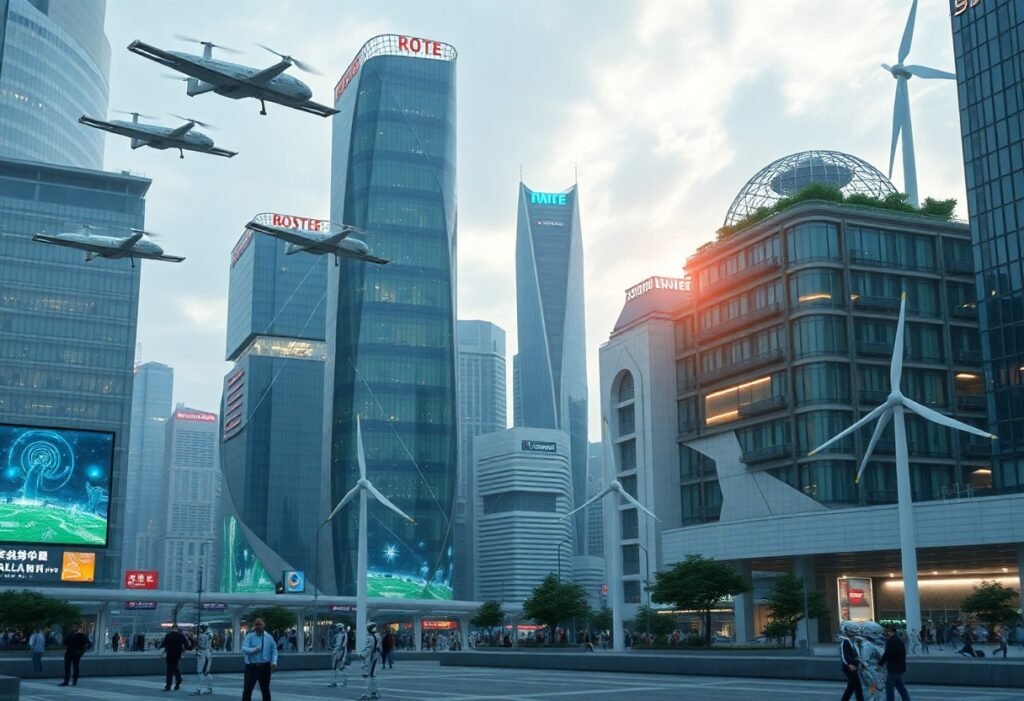With the advent of 5G technology, you are on the brink of a revolutionary shift in how you interact with devices and services. This enhanced connectivity not only promises faster data speeds but also opens the door to innovative applications that could transform various aspects of your daily life, from smart homes to autonomous vehicles. However, it is necessary to consider both the benefits and challenges that accompany this technology, as it shapes the future of communication and innovation.
1. Enhanced connectivity enables smarter homes and cities.
2. Faster internet speeds improve remote work efficiency.
3. Revolutionizes healthcare through telemedicine and real-time monitoring.
4. Transforms entertainment with high-definition streaming experiences.
5. Fuels advancements in autonomous vehicles and logistics.
6. Empowers industries with IoT integration and automation.
Understanding 5G Technology
What is 5G?
For many, 5G represents the next frontier in mobile communication technology. It stands for the fifth generation, and it builds upon its predecessors—2G, 3G, and 4G—by delivering faster speeds, lower latency, and greater connectivity. Along with the ability to handle an exponentially larger number of devices, 5G aims to enhance user experiences across various applications, from smartphones to smart cities. Its architecture is based on a mix of new technologies, including millimeter wave frequencies, small cells, and advanced antenna technology, which collectively create a more efficient and robust communication network.
Key Features and Advantages
For anyone seeking to understand the potential of 5G, it is crucial to look at the core features and advantages that distinguish it from earlier mobile technologies. 5G offers an impressive suite of benefits that could change how you interact with technology and enhance your daily activities. Along with faster downloads and uploads, 5G technology also supports innovative applications like augmented reality and the Internet of Things (IoT), resulting in a more connected life. The following key features stand out:
- High-Speed Data Transfer: Experience download speeds that can reach up to 10 Gbps.
- Low Latency: Enjoy reduced delay times as low as 1 millisecond.
- Massive Device Connectivity: Connect over a million devices per square kilometer.
- Energy Efficiency: Experience optimized energy usage for longer battery life in connected devices.
- Enhanced Network Reliability: Access a more stable connection, even in crowded environments.
The advancements of 5G are akin to unlocking a new dimension of technological capabilities.
To truly appreciate what 5G can offer, it’s important to dive deeper into its features and advantages. The impact of transitioning to 5G technology is substantial, potentially transforming industries such as healthcare, manufacturing, and entertainment. You may experience smoother streaming services, more responsive gaming interactions, and quick access to cloud computing resources. Key features that set 5G apart include:
- Ultra-Reliable Low-Latency Communication (URLLC): Ideal for critical applications like autonomous vehicles and remote surgeries.
- Enhanced Mobile Broadband (eMBB): Delivers high-capacity bandwidth for seamless video conferencing.
- Massive Machine-Type Communications (mMTC): Supports numerous IoT devices operating simultaneously.
- Network Slicing: Enables multiple virtual networks on a single physical infrastructure.
- Spectral Efficiency: Maximizes the use of available frequency bands.
The potential of 5G is vast, offering improvements and innovations that could reshape your everyday experiences and the future of technology itself.
Enhanced Connectivity in Daily Life
Some of the most remarkable consequences of 5G technology will be felt in the way we connect with our surroundings, ushering in an era of enhanced connectivity that affects every aspect of your daily life. You may find yourself in a world where streaming high-definition content, downloading large files, and engaging in seamless video calls are not only possible but are expected norms. As posited in The Impact of 5G Technology: Transforming Connectivity …, this improved connectivity lays the groundwork for limitless opportunities in both personal and professional spheres, fundamentally changing how you approach communication and information exchange.
Smart Homes and IoT Devices
With the rollout of 5G, your smart home can reach new levels of intelligence and integration. Imagine being able to control your smart thermostat, lights, security cameras, and even kitchen appliances effortlessly from the touch of your smartphone—all working in sync and responding in real-time. The low latency and high reliability of 5G networks mean that your Internet of Things (IoT) devices can communicate with each other almost instantaneously, making your living space far more efficient, secure, and comfortable. As you embrace these innovations, you will not only enhance your daily convenience but also pave the way for energy savings and improved home security.
Improved Transportation and Mobility
For modern transportation, 5G technology provides a blueprint for redefining how you navigate your urban environment. As traffic congestion becomes increasingly problematic, the integration of 5G into transportation systems will facilitate smarter traffic management, allowing for real-time data sharing among vehicles. You will notice a smoother experience as your car optimizes routes based on current conditions, reducing time spent on the road while enhancing safety. Moreover, this advancement supports the development of autonomous vehicles, which rely on rapid data exchange for navigation and situational awareness.
Life in a 5G-empowered world will soon showcase more than just improved connectivity. The potential for your journey to become more efficient is significant, as connected infrastructure can lead to safer road conditions and fewer accidents. With the constant exchange of data, traffic alerts can be instantaneously relayed to your devices, enabling you to make better-informed decisions. Additionally, the rise of autonomous vehicles heralds a future where you may feel less stress behind the wheel, giving you time for other pursuits as you allow technology to manage your commute. However, as beneficial as these innovations are, the adoption of such advancements must also consider security challenges and potential vulnerabilities associated with increased connectivity.
5G and Health Care Innovations
Your understanding of health care will transform as 5G technology begins to permeate various aspects of clinical practice, bringing forth extraordinary innovations that enhance patient care and streamline processes. With its unparalleled data transfer speeds and low latency, 5G is set to revolutionize how healthcare providers interact with patients and collaborate with one another. For a deeper insight into this topic, you can check out How will 5G Technology Change Our Daily Life? and see the immediate benefits that this emerging technology is poised to offer.
Remote Patient Monitoring
Behind the scenes, these technologies enable a new era of remote patient monitoring, allowing healthcare providers to continuously track patients’ vital signs and health metrics in real-time. This capability significantly enhances the effectiveness of chronic disease management and reduces the need for hospital visits, providing you with the peace of mind that comes from knowing your health is being monitored closely. By leveraging the high-speed connectivity of 5G, data can be transmitted quickly and securely to healthcare professionals, ensuring timely interventions when necessary.
Telemedicine Advancements
At the forefront of healthcare innovations is the rapid advancement of telemedicine, a service that allows you to consult with medical professionals without physically visiting a clinic. With 5G technology, the quality of virtual consultations has notably improved through high-definition video, immersive virtual reality environments, and interactive health applications. You can access specialists across the globe and receive diagnoses or treatment recommendations with unprecedented ease. This represents not only a shift in accessibility but also in the quality of care you receive.
Further, the integration of 5G into telemedicine has opened the door for a more efficient healthcare system, reducing both travel time and associated expenses for patients. Moreover, this accessibility leads to faster diagnoses and the ability to follow up on treatment plans effectively. Telemedicine powered by 5G allows for a fluid exchange of information between you and your healthcare provider, making it easier to manage your health proactively and improving outcomes significantly.
The Future of Work with 5G
After the implementation of 5G technology, your workplace is poised to undergo a dramatic transformation that will redefine the very essence of collaboration and productivity. With ultra-fast data transfer rates and low latency, you can expect your daily tasks to become more efficient than ever before. This revolutionary connectivity will make remote work not only feasible but also highly productive, allowing you to connect seamlessly with colleagues and clients around the globe as if they were right beside you. The integration of AI and machine learning with 5G will enhance your workflow, enabling you to harness data analytics in real-time.
Remote Collaboration Tools
One of the most significant advancements you will experience in the wake of 5G technology is in remote collaboration tools. These tools are set to become more dependable and responsive, allowing you to engage in high-quality video conferencing, real-time collaboration, and even virtual reality meetings without lag. Imagine being able to share large files, run complex applications, and engage in seamless discussions, all while harnessing the power of cloud computing. Your ability to interact and contribute to projects will feel as though you’re in a physical office, promoting healthy communication flow and teamwork.
Impact on Various Industries
Besides enhancing remote collaboration, the impact of 5G on various industries is profound. You will see a surge in innovations across sectors such as healthcare, manufacturing, and education. For instance, in healthcare, 5G will facilitate remote surgeries and telemedicine initiatives, allowing doctors to treat patients from afar. In manufacturing, you’ll witness the rise of smart factories where machines communicate in real-time, boosting efficiency, safety, and productivity. In the education sector, access to immersive content will transform traditional learning experiences, empowering you and your peers to engage with interactive materials from anywhere in the world.
Work environments will not just be redefined; they will also become more agile and adaptive due to 5G’s capabilities. This technological leap will encourage innovative approaches that blend automation, data insights, and flexible work arrangements, enabling you to flourish in a landscape that prioritizes efficiency and collaboration. You will find that this new paradigm not only enhances your own professional journey but also contributes to a sustainable future for industries as a whole.

Challenges and Concerns
The rapid rollout of 5G technology promises immense benefits, but it also brings forth significant challenges and concerns that you should be aware of. As you integrate 5G into your daily life, you might encounter issues such as security vulnerabilities and infrastructure limitations that could impact your user experience and the reliability of network services. These challenges require urgent attention to ensure that the potential of 5G is fully realized while protecting your interests.
Security and Privacy Issues
By connecting more devices than ever before, 5G technology inevitably increases the attack surface for cybercriminals. You must consider the risks associated with the enhanced interconnectivity of your devices, as the likelihood of data breaches or privacy violations also rises. Additionally, with improved data transmission speeds and greater volumes of data being collected, safeguarding your personal information becomes paramount, necessitating stronger security protocols and privacy frameworks to mitigate potential risks.
Infrastructure Limitations
Between the excitement surrounding 5G capabilities and the practicalities of its implementation lies the issue of infrastructure limitations. Your access to 5G services is contingent on the availability of the necessary network infrastructure, which may not be uniformly distributed across different regions. In some areas, you might find reliable access to 5G networks, while in others, you may still be reliant on older technologies, creating a disparity in user experience that cannot be overlooked.
With the deployment of 5G technology, you may notice that certain infrastructure challenges, such as the need for new cell towers and comprehensive fiber optic networks, must be addressed to ensure broad coverage. The cost and logistical complexities of upgrading existing infrastructure can hinder the rollout in rural or underdeveloped areas, potentially leaving some of you without full access to the advantages of 5G. As a result, it is crucial to consider how these limitations can influence both your current user experience and the overall potential for innovation in a 5G-enhanced future.
Global Implications of 5G Adoption
Despite being a relatively recent development, the global implications of 5G adoption are already becoming apparent. As more countries roll out this advanced technology, you will likely see a significant transformation in how industries operate and how nations interact with each other. Enhanced connectivity will not only foster the growth of international businesses but also bridge gaps between developed and developing nations. With increased access to faster and more reliable internet, regions that were previously underserved will have the opportunity to integrate into the global digital economy, opening doors to innovation and collaboration that were previously unimaginable.
Economic Impact
By embracing 5G technology, you will witness a dramatic shift in the global economic landscape. The potential for growth is immense, as industries such as healthcare, automotive, and manufacturing are set to benefit from increased efficiency and productivity. As your business or workplace adopts these technologies, you’ll find that streamlining operations and reducing costs become more achievable. Additionally, the creation of new jobs related to 5G infrastructure will help boost local economies and encourage technological literacy in your community.
Societal Changes
Impact extends beyond economic growth when considering 5G technology’s societal changes. As you engage with faster networks, you’ll notice enhanced access to information and services, which can improve your quality of life. With the proliferation of smart devices, your daily routines may transform through improved communication, telemedicine options, and enhanced entertainment experiences. This interconnectedness could lead to more informed communities and increased civic engagement as people utilize technology to voice their opinions and mobilize for local causes.
With the rise of 5G technology, there’s also a potential for increased issues related to privacy and security. As you connect more devices to the internet, it raises concerns about data protection and potential cyber threats. However, a strong emphasis on cybersecurity measures and regulations can ensure that the positive aspects of societal change outweigh the risks. Overall, 5G’s influence on society could be a transformative force, depending largely on how you choose to leverage it.
Summing up
Drawing together the various dimensions of 5G technology, it’s clear that this advancement is reshaping your daily life in profound ways. With faster internet speeds and enhanced connectivity, you can experience seamless streaming, instantaneous downloads, and improved communication. Whether you’re working remotely, engaging in virtual reality, or utilizing smart home devices, 5G enhances your ability to connect and interact with the world around you. As industries integrate this technology, you’ll likely benefit from increased efficiency, reliability, and innovative services tailored to your needs.
Looking ahead, the potential future innovations spurred by 5G are vast and exciting. As you embrace this technology, you might find transformative changes in healthcare, transportation, and entertainment. From remote surgeries performed by specialists around the globe to autonomous vehicles navigating smart cities, the applications of 5G will directly influence how you live, work, and play. Ultimately, your interaction with this technology will not only enhance your personal experiences but also pave the way for a more connected and intelligent future.









